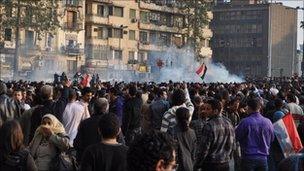Egypt protests: Eyewitness accounts
- Published

Maryam Helmy: "There were thousands of people full of rage and anger"
Thousands of people took part in rare anti-government protests in Egypt after an internet campaign inspired by the uprising in Tunisia.
In Cairo, where the biggest rallies were held, police used tear gas and water cannons in an attempt to disperse the crowds. At least three people have been killed, reports say.
Here, eyewitnesses describe the atmosphere during the day's events.
Abd-Allah, Cairo resident
I saw the riot with my own eyes. We were out in the morning, we didn't intend to protest, but we were caught up in it. I saw the police arresting everybody in a restaurant. Shortly afterwards we went home as it was too dangerous to stay out.
Now we are watching from the window what is happening outside. I hear people chanting: "Down with the president." I've seen the police using tear gas against protesters, though I haven't seen any violence. People are behaving as if they are ready to die. They keep pushing forwards.
Some people say that they won't stop until Mubarak is gone. The noise from the street is increasing not decreasing even though it is 2230 (2030 GMT). There are more people now than during the day. There are people gathered downtown where the parliament building is located. I have friends among the crowd and they tell me what is happening.
The atmosphere is very tense, it feels like a revolution. I see people who are determined, people who have nothing to lose, people who want a better future.
This protest is different. Previous protests would last about an hour, this seems to be much larger, much longer. I think this could bring only violence. Mubarak is so power hungry, he would do anything to hang on to power. If people keep on pushing, many will end up in jail.
Hussein, protester, Cairo
I participated in the protests today. I have to say I was surprised by the number of people who attended. These high numbers are unusual in Egypt.
People are afraid to speak out, but it seems that what happened in Tunisia encouraged many to protest in Egypt.
On the streets it seemed that the police were trying to avoid confrontation with the protesters, at least at the beginning of the day. Many of the senior officers were ordering the soldiers not to make any contact. They were only trying to form a cordon around the demonstrators, that was in Shobra.
But when our protest broke the cordon and joined with the major protest in El Tahrir, we found that it was more violent there. Although it was a peaceful protest, the police threw tear gas and fired/sprayed water canons.
Some protesters threw rocks at the police, which the police threw back. Most protesters however were trying not to be violent and many people were discouraging any acts of violence against the police.
I got the feeling in the end that the police were trying to make the protest go violent - that would give them an excuse to beat and arrest the protesters.
Courtney Graves, American living in Giza
Courtney: "I've never seen men so angry, yet so happy to express their anger"
I went alone to Tahrir square today - my Egyptian friends seemed to think that the demonstration wouldn't live up to the hype.
But news of the incredible turnout had reached my friend Gehad and she was fervently trying to find someone to accompany her into the city. She never made it to the demonstration but she at least let me know what to expect.
I surfaced from the Metro station into a scene of happy panic. Riot police were lined up along every street and it was almost impossible to move at first. From afar, I could hear a roar of human voices coming from one side of the square.
I managed to find higher ground to stand on and I saw an immense mass of people making their way towards where I was standing. I saw as they managed to get past the authorities restraining them and they were finally able to express the anger so evident in their faces.
As the group passed me I joined them. Emotions were so high and passions so great it was almost tangible. I've never seen men so angry, yet so happy to be expressing their anger.
I walked next to girls in hijabs (Islamic headscarves) screaming for the downfall of Hosni Mubarak. I walked behind men begging God for freedom.
In the middle of the tumult, I spotted two Muslim men praying in the middle of the sidewalk.
I soon heard screams from behind me and realised that the police had sent tear gas canisters flying into the air. Everyone began to run away from the source.
Fortunately, I avoided the full force of the gas but my fellow protesters were not so lucky. Screams for water filled the air as men dropped to their knees, covering their faces. I saw one little girl furiously rubbing her eyes as tears streamed down her face.
I stayed for another hour, on the sidelines. I felt different about Egypt as I walked away, like the political stagnancy had finally come to an end. As I walked across a bridge to Zamalek I could still hear chants coming from Tahrir, "Horreyya, Horreyya, Horreyya!" - "Freedom, freedom, freedom!"